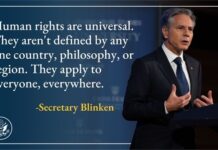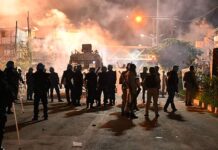The 2013 movement in Dhaka, Bangladesh, or more widely known as the Shahbag Protest, took place on 5th February  2013. The purpose of the movement was to bring Abdul Quader Mollah – a war criminal from the 1971 Liberation War of Bangladesh – to justice. The movement started off from the Shahbag area in Dhaka and slowly made its way across the country. To understand the more about the movement, we need to an overview of the Liberation War.
2013. The purpose of the movement was to bring Abdul Quader Mollah – a war criminal from the 1971 Liberation War of Bangladesh – to justice. The movement started off from the Shahbag area in Dhaka and slowly made its way across the country. To understand the more about the movement, we need to an overview of the Liberation War.
It all started when Bangladesh (formerly known as East Pakistan) wanted independence from West Pakistan. Even though the east was more populated, politics was dominated by parliamentarians from the west. Then in 1970, for the first time, the election was won by the east. The west was of course unhappy about it and they refused to honour the election results. A mass protest from the east took place demanding them to honour to result. The west, through the Pakistani military, attacked the protesting civilians – many of them were students – and this resulted in retaliation and then war.
Back to the movement. According to the media, this uproar in Shahbag occurred due to the lack of will to punish war criminals, but in reality it was so much more than that.
 It is a common stereotype of Bangladesh that our political system is very much corrupted and being a Bangladeshi citizen myself I wish I could disagree. It is as if an independence from one tyranny gave rise to another in the same country by its very own people. Bangladeshi citizens who voted for the current government in the first place gradually became complacent with the inherent problems of corruption and just got accustomed to it. So this recent movement is here not as an attack towards the justice department, but for the youth of the country to address this elephant in the room once and for all.
It is a common stereotype of Bangladesh that our political system is very much corrupted and being a Bangladeshi citizen myself I wish I could disagree. It is as if an independence from one tyranny gave rise to another in the same country by its very own people. Bangladeshi citizens who voted for the current government in the first place gradually became complacent with the inherent problems of corruption and just got accustomed to it. So this recent movement is here not as an attack towards the justice department, but for the youth of the country to address this elephant in the room once and for all.
Sadly, what started off as citizens’ protest turned into another one of the government’s chess pieces in the scheme to further their political agenda. The current ruling government body of Bangladesh, Awami League (AL), has been looking to sabotage the public image of Jamaat-e-Islam, the largest Islamist party in Bangladesh, and it got the perfect opportunity to do so. As the alleged war criminal Abdul Quader Mollah is the Assistant Secretary-General of Jamaat-e-Islam, AL made sure that the protest was not only about the individual himself but about the entire party. The other sad thing with the political parties in Bangladesh is that they tend to take things a bit too far.
They started picturing anyone who is seen as a traditional Muslim as a member of Jamaat (a party which has an war criminal as the second top leader who is yet to be prosecuted). Imagine how the public reacted and the horrifying scenes of ordinary Bangladesh citizens mistreating (and even physically torturing) Muslims on the streets who had nothing to do with the party.
 Jamaat retaliated as well, obviously, leading into a full scale civil war whose backlash can still be felt in the country. By now, this entire issue has absolutely nothing to do with the punishment of the war criminals anymore. What we have now is nothing but a clash of personal vendetta between the two parties, further resulting in the general public falling in the cross-hair of something they have not even asked for. What do we get? A severe detriment to the security and economy of the country.
Jamaat retaliated as well, obviously, leading into a full scale civil war whose backlash can still be felt in the country. By now, this entire issue has absolutely nothing to do with the punishment of the war criminals anymore. What we have now is nothing but a clash of personal vendetta between the two parties, further resulting in the general public falling in the cross-hair of something they have not even asked for. What do we get? A severe detriment to the security and economy of the country.
Personally, I felt that such a movement was very much necessary, but I do not in any means support the outcome of it. I have a personal interest in the movement as a lot of my friends from back home have been present at the scene and that allowed me to get information regarding the issue which was “untainted” by the media or the policy makers of the country. I also thought that, for once, a public message can be conveyed without an outbreak of violence. The fact that most of the protestors were actually educated individuals in the first place was very encouraging.
According to my friends who participated in the protest, the reason they had to step out of it because the only thing that was left at the later stages was just violence, which was not something they signed up for in the first place. Despite my hopes for my country to be mature enough in conveying ideas in the public, what happened in the end does not sound promising to me at all.
If the history of Bangladesh has taught us something, it is this: such movements have taken place before and will do so again. And the political parties of the country will always find a way to mould it to fit their personal advantage. Maybe the party will win the next election, maybe it won’t, but make no mistake that it has not done any of this for the well-being of the people. The leaders of the country will rarely try and come up with an innovative idea to the country forward, but will always have some diabolical plans up its sleeves to make sure that the other parties are not successful.
Source: Thetypewriter











Notwithstanding the fact that the West Pakistanis were more or less exploiting the people of East Pakistan, the eternal avarice of Bangalee people is no less responsible for the subsequent events following independence. One stark example is that all the houses, flats and buildings most of which were once constructed for the refugees – mainly for non-Bengalees from India – were occupied by Bangalees without the least pinch of conscience. Now if one dares to conduct a survey, it will reveal how voracious were most of the so-called FFs and the ’16th Division’ to grab whatever was available near at hand. And can anyone deny that most of our leaders wanted to occupy the establishments of the non-Bengalees just like most of them occupied the property abandoned by the Hindus after partition? About the insatiable greed of us Bangalees, one may read respected Syed Abul Maksood’s ‘Bangalees’ greed to grab others’ property’ (Banngalir paraswapohoronspriha). And ‘greed begets sin, and sin fetches death’ is a very well-known proverb. Besides, doling out relief materials without doing any thing has made us even more greedy. And greed is never satiable. So we are destined to fall in wrong hands as long as we shall not learn to hate ‘greed’ and lust. Isn’t it true that a people deserve such leaders as they themselves are?